When a recent story went viral about a husband yelling at his wife for serving a vegetarian dinner, many people were quick to take sides. On the surface, it sounded like just another heated argument over food, but the truth behind this viral moment reveals much deeper issues about relationships, communication, and expectations in modern marriages. This kind of story captures attention because it reflects real-life struggles couples in the United States often face, where busy schedules, lifestyle choices, and personal beliefs can easily clash in everyday life.
The dinner dispute started with something simple: the wife prepared a healthy vegetarian meal, but the husband expected meat on the table after a long workday. His frustration boiled over, leading to yelling and tension that quickly became a bigger discussion about respect, compromise, and how couples handle differences. What makes this story so powerful is that it isn’t just about food it’s about how people feel valued and understood in their marriages. Many readers in the U.S. can relate to similar moments where small disagreements escalate into emotional battles.
Take, for example, a common scenario in many American households. Imagine a wife trying to introduce healthier eating habits by cooking vegetarian dishes a few nights a week. She sees it as an act of care, hoping her family benefits from a better lifestyle. On the other hand, the husband, used to eating meat daily, feels deprived and overlooked. When he lashes out, it isn’t only about the dinner it’s about feeling ignored in decisions that affect his life. This tension is relatable because food is often tied to comfort, tradition, and identity, making it more than just what’s on the plate.
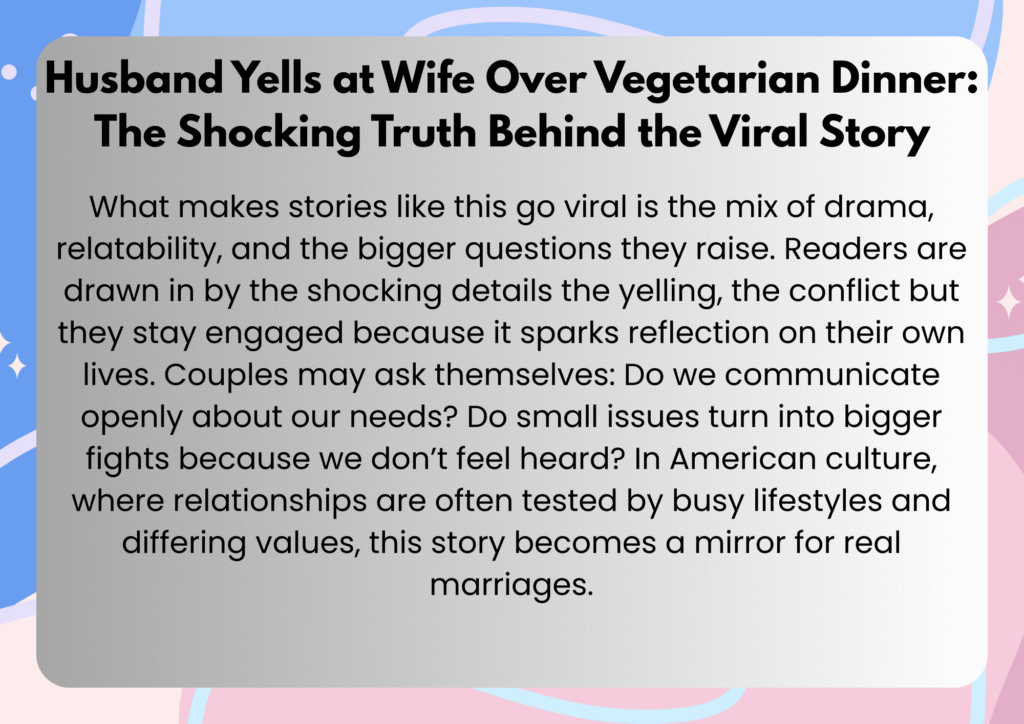
The truth behind the viral dinner fight is not just about one couple it’s a lesson in empathy and compromise. Whether it’s food, money, or household responsibilities, disagreements are natural, but how couples choose to resolve them determines the strength of their bond. For U.S. readers, this post highlights how small conflicts can reveal deeper issues, and why understanding each other’s perspectives can prevent unnecessary drama. By looking beyond the argument, people can learn to build healthier, more supportive relationships.
Husband Yells at Wife: When Dinner Turns into Drama
A quiet family evening can sometimes take a surprising turn when small disagreements grow into bigger conflicts. The story of a husband yelling at his wife during dinner is something many couples in the United States can relate to, because mealtime is often more than just about food. It becomes a space where emotions, stress, and expectations collide. When a husband reacts strongly over something as simple as dinner, it is rarely about the food itself it is about unspoken feelings, pressure from daily life, and the way couples communicate with each other. This type of story instantly captures attention because it feels so real and relatable, almost like watching a scene play out in your own neighborhood. Readers are naturally curious about what led to the argument, how it escalated, and what lessons can be learned from it.

When he sees the vegetarian meal, his frustration boils over, and he raises his voice. What started as a simple difference in taste quickly turns into drama at the dinner table. This scenario shows how emotions tied to stress, expectations, and even cultural eating habits can turn a normal night into a conflict. Readers in the United States understand these dynamics because many have either experienced them firsthand or witnessed them in family gatherings.
Stories like this create interest because they are built on everyday situations that carry a deeper meaning. They highlight how small issues can reveal bigger truths about relationships, respect, and communication. For an American audience, these posts resonate because they reflect the challenges of balancing work, family life, and personal choices. People are drawn to these stories not just for the drama but for the chance to see their own lives reflected in them and to think about how they might handle the same situation differently. By turning a simple dinner disagreement into a relatable narrative, the post encourages reflection and sparks conversation, making readers more engaged and eager to share their own experiences.
Husband Yells at Wife: The Vegetarian vs. Non-Vegetarian Debate
Marriage can sometimes be filled with small disagreements that unexpectedly turn into bigger arguments, and one of the most common issues many couples face is food choices. In households across the United States, the debate between vegetarian and non-vegetarian meals is becoming more common as families grow more health-conscious and diverse in their eating habits. A simple dinner plan can quickly turn into a heated discussion when one partner prefers plant-based meals while the other craves meat. This situation reflects not just differences in food but deeper themes of respect, compromise, and lifestyle values in a relationship.
Imagine a real-life scenario in an American household where the wife spends time preparing a healthy vegetarian dinner filled with vegetables, grains, and spices. She feels proud of her cooking and believes it will benefit her family’s health. However, when her husband sits down at the table, he becomes upset because he was expecting chicken or beef as the main dish. What starts as disappointment soon escalates into raised voices, with the husband accusing his wife of ignoring his preferences and the wife feeling unappreciated for her effort. The dinner table, meant to bring connection, suddenly becomes a battleground over food choices.
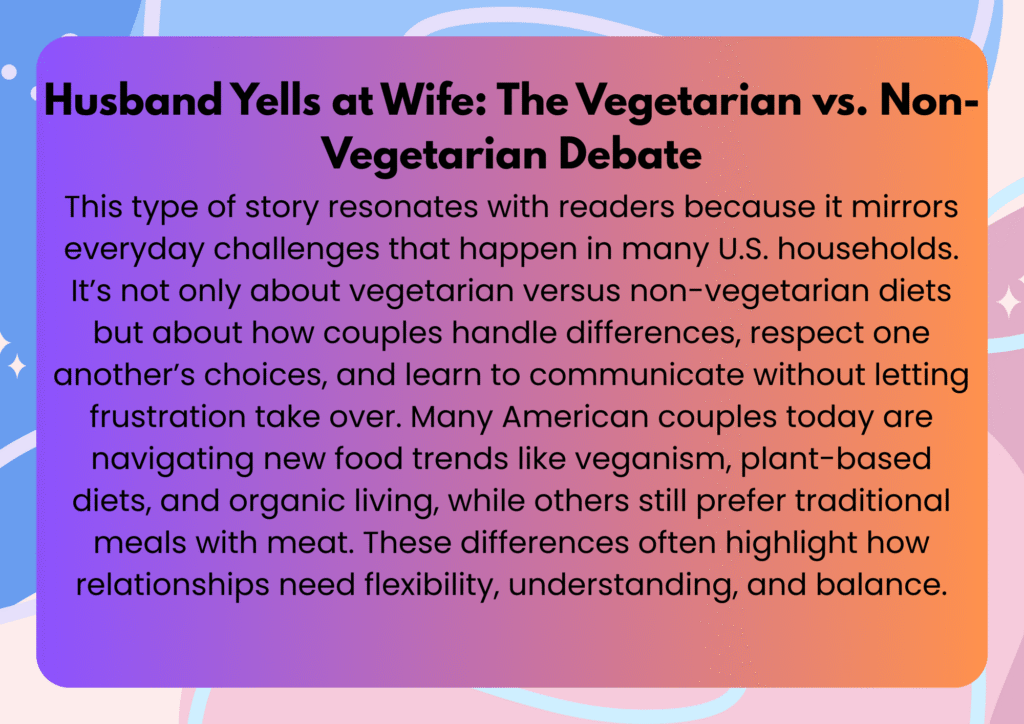
A real-life example that makes this relatable is when families in the U.S. celebrate Thanksgiving. Some households now include vegetarian or vegan dishes alongside the traditional turkey. In these cases, the family finds a middle ground by preparing a mix of meals that respect everyone’s preferences. Similarly, in marriages, compromise can turn conflict into connection. Instead of yelling or dismissing each other’s choices, couples can find creative ways to include both vegetarian and non-vegetarian options, making meals more inclusive and less stressful.
Stories like this are interesting because they reflect the emotional drama of everyday life while also teaching valuable lessons about patience and compromise. Readers are drawn to such narratives because they see themselves in the characters. The vegetarian vs. non-vegetarian debate is not just about food it’s about love, communication, and the effort to keep a marriage strong even in the face of small but meaningful disagreements.
Husband Yells at Wife: Respect in Marriage Is Non-Negotiable
Marriage is built on love, trust, and respect, but when those values are ignored, even small disagreements can turn into painful conflicts. A story that resonates with many couples is when a husband yells at his wife during an argument, forgetting that words can cut deeper than actions. Respect in marriage is not optional; it is the foundation that keeps a partnership strong. Without it, even the happiest relationships can feel broken. Imagine a dinner in an average American household where a wife spends time preparing a meal, expecting her partner to appreciate the effort, but instead, the husband raises his voice because the food isn’t what he wanted. This moment doesn’t just ruin dinner it damages trust, creates emotional distance, and leaves both partners feeling unheard.
Respect is not about agreeing on everything but about listening, understanding, and communicating calmly even when disagreements happen. In the United States, many couples juggle busy schedules, financial stress, and family responsibilities, which can lead to tension at home. But when frustration turns into yelling, it sets a harmful pattern. Real-life examples show how damaging this can be. For instance, a couple in Chicago shared how constant shouting almost ended their marriage until they sought counseling. The husband admitted that raising his voice was his way of releasing stress, but he later realized it was pushing his wife away. When he chose respect over anger, their relationship grew stronger, and they learned to argue without tearing each other down.
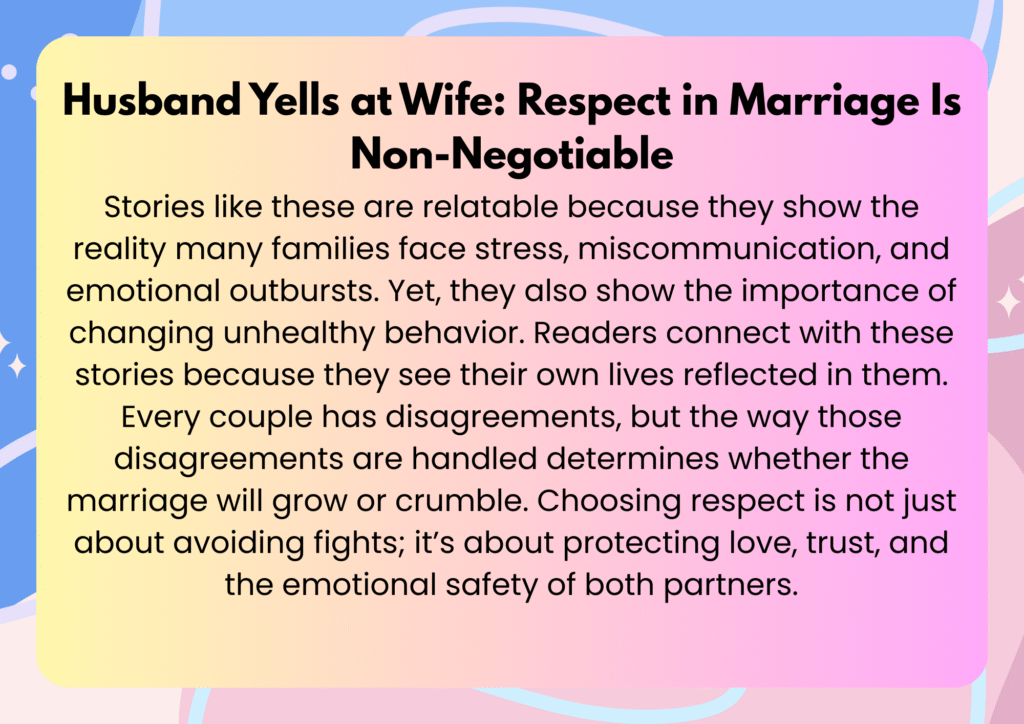
For American audiences, this topic hits close to home because it reflects everyday family dynamics. Whether it’s about dinner, finances, or parenting, disagreements will always exist. But when couples remember that yelling only deepens the divide, they can shift toward healthier communication. Respect in marriage is non-negotiable, and every reader can take away the reminder that love lasts only when both partners choose kindness, patience, and understanding over anger.
Husband Yells at Wife: The Effort Behind Every Meal
A marriage is built on love, respect, and appreciation, yet one of the most common arguments in many households starts in the kitchen. Imagine a wife who spends her entire day juggling responsibilities managing her career, taking care of children, and ensuring that the house runs smoothly only to end her evening by preparing dinner for her family. Instead of gratitude, she is met with anger because the meal is not what her husband expected. When a husband yells at his wife over food, it is not really about the dinner itself but about the lack of respect for the effort behind every meal. Cooking is not just about serving food; it is an act of care, sacrifice, and love. Every chopped vegetable, every seasoning, and every minute spent in the kitchen carries the message, “I care for you.”
In the United States, where both partners often work full-time jobs, the pressure of daily responsibilities makes household tasks even more challenging. A real-life example is when a working mother comes home after a long day at the office and still prepares dinner for her family. She could easily choose takeout or fast food, but instead she puts in the effort to cook something fresh and healthy. Yet, instead of appreciation, she may hear complaints like, “Why didn’t you make what I like?” or “This isn’t how I wanted it.” For many women, moments like this cut deeply, because the complaint ignores the time, energy, and emotional effort behind preparing the meal. In American culture, where stress and busy schedules are already overwhelming, such ungrateful reactions can push a marriage toward resentment and distance.
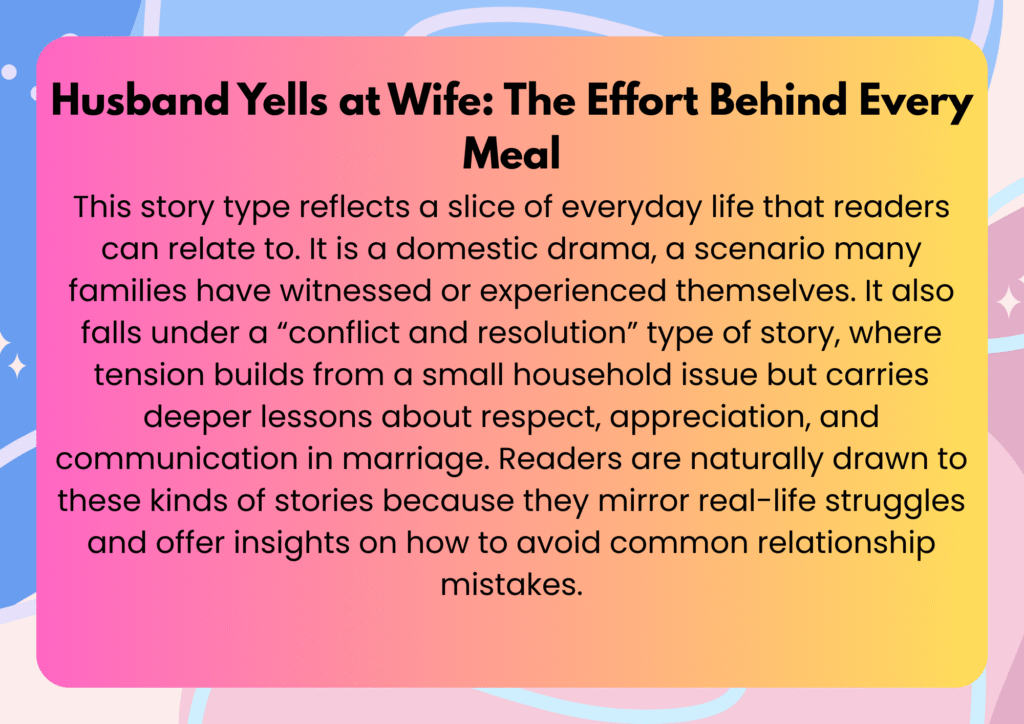
The message is simple yet powerful: yelling over dinner is not about the food, it’s about failing to value a partner’s effort. Respect in marriage is not shown by grand gestures alone but by small acts of kindness, gratitude, and patience. A simple “thank you” for a meal can mean more than an expensive gift. Couples who learn to appreciate each other’s daily efforts build stronger marriages and healthier family environments. Real respect begins at the dinner table, where gratitude should replace anger, and love should speak louder than complaints.
Husband Yells at Wife: The World Is Moving Toward Plant-Based Meals
When a husband yells at his wife over what’s being served for dinner, it may seem like a small domestic disagreement, but behind it lies a bigger story that connects to changing food habits around the world. More couples in the United States are facing these kinds of dinner table conflicts as plant-based meals become a regular part of households. The wife may be making a healthier choice by preparing a meatless dinner, but the husband used to traditional meat-heavy meals may feel upset or unappreciated. This everyday argument reflects a much larger shift in society, where plant-based eating is no longer just a trend but a lifestyle that’s growing stronger each year.
In the United States, grocery stores and restaurants are filled with plant-based alternatives. From Beyond Meat burgers at fast food chains to almond milk replacing dairy in morning coffee, families are noticing how quickly the food culture is changing. A husband who grew up on steak and potatoes might find it frustrating when his wife serves lentil soup or roasted vegetables, but this frustration often comes from not understanding the benefits behind the change. Plant-based meals are healthier for the heart, better for weight control, and often more affordable. At the same time, they also connect to larger issues like sustainability and caring for the environment.

Stories like these create emotional interest because they are both personal and universal. They reflect everyday struggles between spouses but also tie into the broader cultural shift happening in America. Readers see themselves in these scenarios, whether as the wife trying to make healthier choices or the husband feeling unheard at the dinner table. By connecting small household arguments to larger food movements, the story keeps readers engaged while also encouraging them to think about their own choices.
The world is undeniably moving toward plant-based meals, and while families may argue about what’s on the plate, these moments are opportunities for growth and understanding. A husband’s frustration may eventually turn into appreciation once he experiences the benefits of a plant-based lifestyle, and a wife’s effort in preparing meals should always be seen as an act of care. For U.S. families, the key is finding balance—respecting traditions while embracing the healthier, sustainable choices that are shaping the future of food.
Husband Yells at Wife: Communication Is the Real Secret Ingredient
Marriage is often compared to a recipe, and just like any good dish, it needs the right ingredients to thrive. Many couples argue about meals, money, or daily stress, but beneath those conflicts, the real issue usually comes down to communication. When a husband yells at his wife because dinner isn’t what he expected or because the day has been overwhelming, it’s rarely about the food itself it’s about how feelings are being expressed. Words spoken in anger can leave lasting scars, and what could have been a small misunderstanding turns into a much bigger problem. This is why communication is the true secret ingredient in every relationship, especially marriage.
Imagine a real-life example from the United States: a couple in their 30s juggling full-time jobs and raising kids. The wife spends time preparing a healthy dinner, believing it’s a step toward better family habits. The husband, exhausted after a stressful day, expects a comforting meal like he grew up eating. Instead of calmly sharing his feelings, he raises his voice in frustration. This moment, though small, reflects what many American households face misaligned expectations and unspoken emotions. When yelling replaces listening, both partners feel unappreciated, and love takes a back seat to resentment. But when couples pause, explain their needs respectfully, and listen without judgment, the same situation becomes an opportunity for connection rather than conflict.
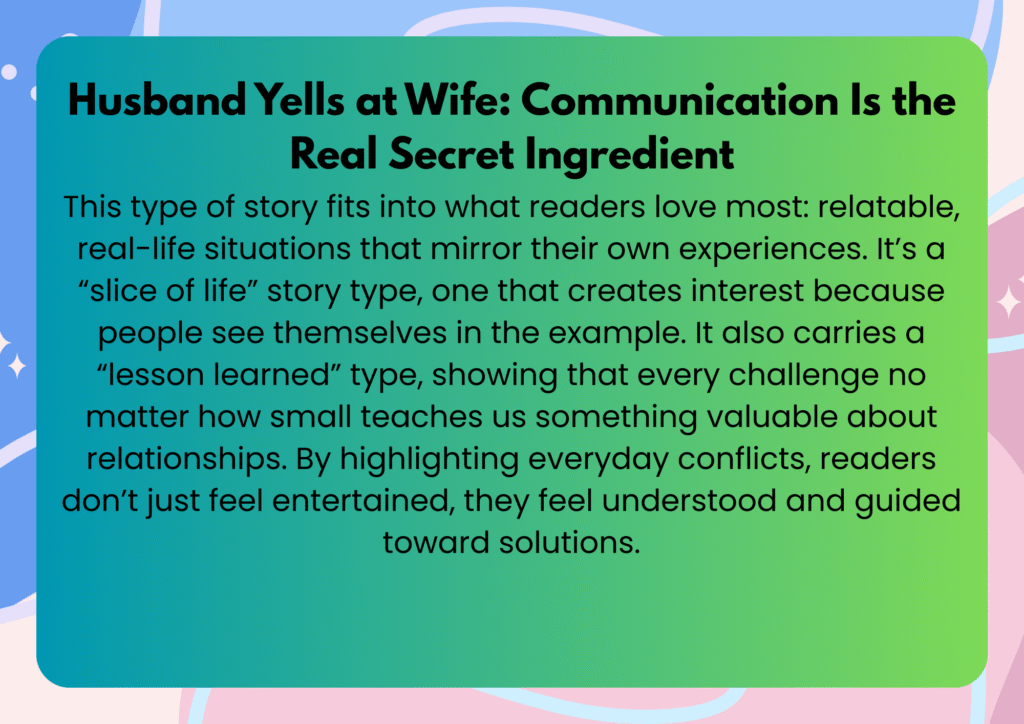
The truth is, communication is not just about words it’s about tone, respect, and timing. For American couples balancing busy schedules, it’s easy to let stress spill over into family conversations. Yet, learning to talk calmly, to express gratitude, and to replace yelling with empathy is what keeps marriages strong. Just like a secret ingredient makes a recipe unforgettable, open and respectful communication is what makes love last. Readers stay interested in posts like this because they are not just stories; they are reflections of real struggles, offering practical wisdom for a happier marriage.
Husband Yells at Wife: How to Handle Conflicts Better
Marriage is not always smooth, and even the strongest relationships face moments of conflict. One common scenario many couples in the United States can relate to is when a husband yells at his wife during an argument. While this situation may seem ordinary, it often highlights deeper issues about communication, respect, and emotional control in a marriage. Conflicts are a natural part of life, but how couples choose to handle them determines whether their relationship grows stronger or begins to weaken. Yelling may feel like a release in the moment, but it usually leads to hurt feelings, misunderstandings, and distance between partners. Instead, learning how to handle conflicts better is the real key to a healthy and lasting marriage.
Many stories like this play out in American households, where stress from work, financial struggles, or family responsibilities can create tension. Imagine a real-life example: a husband comes home from a long day at work, tired and frustrated, and his wife asks about an unpaid bill. Instead of calmly responding, he raises his voice, and the argument quickly escalates. This kind of situation doesn’t just affect the couple it can impact children who witness it, creating an unhealthy home environment. The truth is, while conflict is inevitable, the way couples communicate can either heal or harm the relationship. By choosing patience, active listening, and calm dialogue, couples can turn heated arguments into opportunities for understanding.

When a husband yells at his wife, it’s not just about the raised voice it’s about the underlying emotions of stress, disappointment, or feeling unheard. By shifting from anger to empathy, couples can build stronger bonds. For example, instead of yelling, the husband in the earlier example could take a moment to breathe and then say, “I’m feeling overwhelmed. Can we talk about the bill after I’ve had a chance to relax?” That simple change of tone transforms the conversation from conflict into cooperation. Readers will find hope in these solutions, making them more likely to share and engage with the story.
In the end, conflicts in marriage are not signs of failure they are opportunities for growth. By addressing arguments with understanding instead of shouting, couples create healthier relationships, stronger families, and more loving homes. Stories like these capture attention because they blend everyday struggles with solutions people can apply to their own lives, making the post both engaging and valuable for readers seeking guidance.
Husband Yells at Wife Over Vegetarian Dinner: The Shocking Truth Behind the Viral Story
| Situation | Better Approach | Long-Term Solution | Real-Life Example |
|---|---|---|---|
| Husband embarrassed by vegetarian meal | Thank the wife for effort, add a quick dish if needed | Plan menus together beforehand | A couple alternated menu choices to avoid conflict |
| Wife feels unappreciated | Acknowledge her hard work in front of guests | Show gratitude publicly, discuss concerns privately | One husband praised his wife’s soup even if he didn’t love it |
| Guests expect meat | Offer one meat side dish alongside vegetarian dishes | Create balanced menus | A host served veggie curry with grilled chicken for balance |
| Argument at dinner | Keep calm, solve quietly, talk later | Never humiliate partner in public | Husband ordered pizza instead of blaming his wife |
| Cultural food clash | Educate each other on traditions | Blend traditions into meals | Couples combined BBQ with vegetarian sides |
Publish by: Woman One Network | w1network
At Woman One Network, we believe every woman’s effort in the kitchen deserves appreciation, not criticism. Stories like these remind us that food is love, cooking is care, and respect is the true secret ingredient of every meal.




